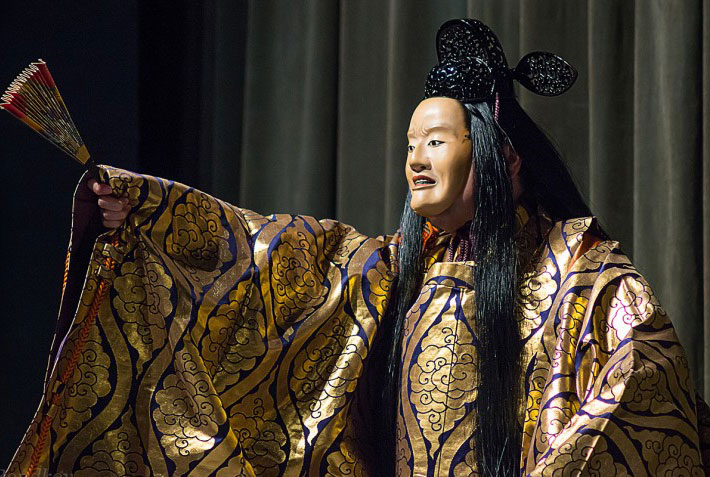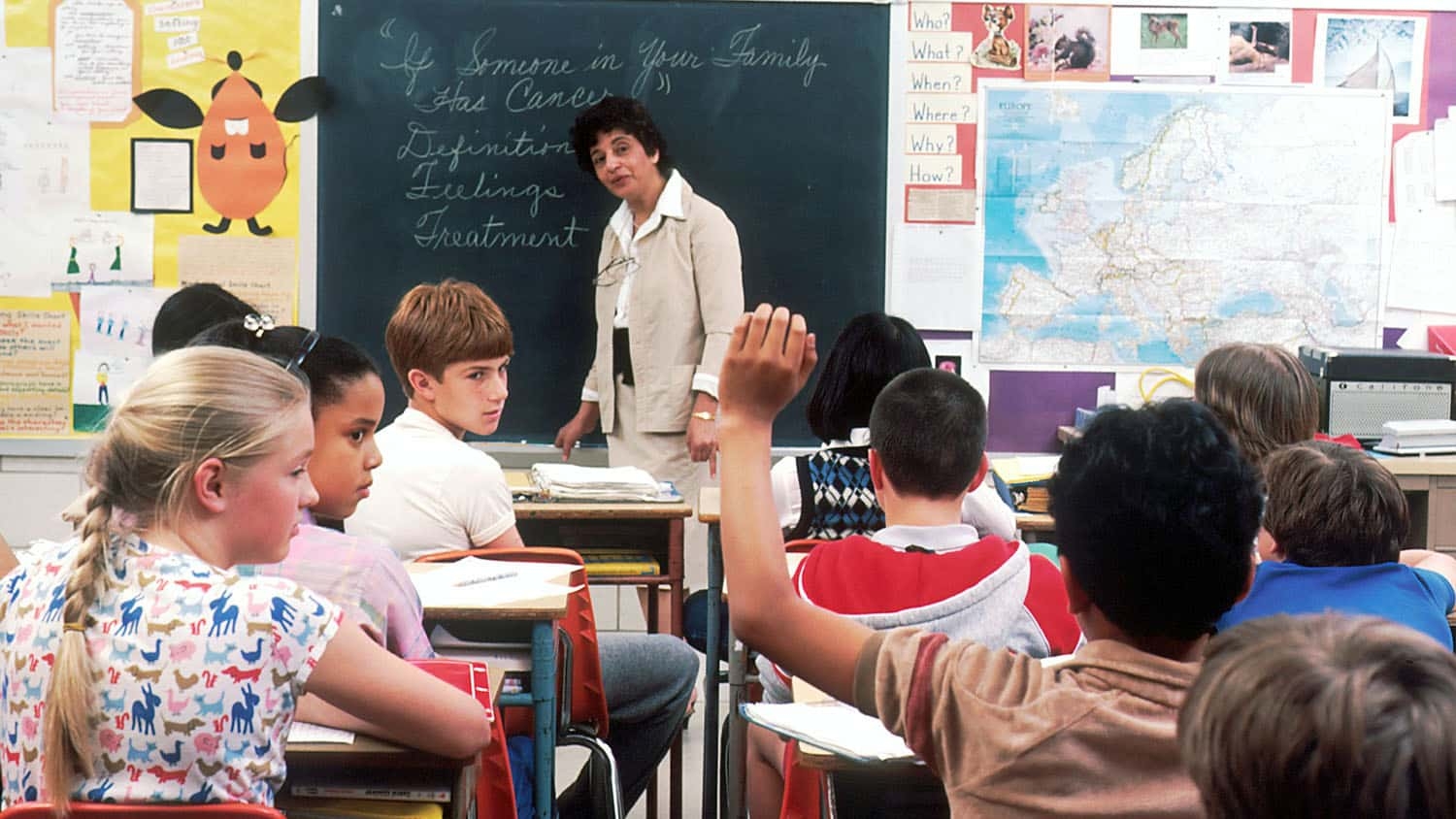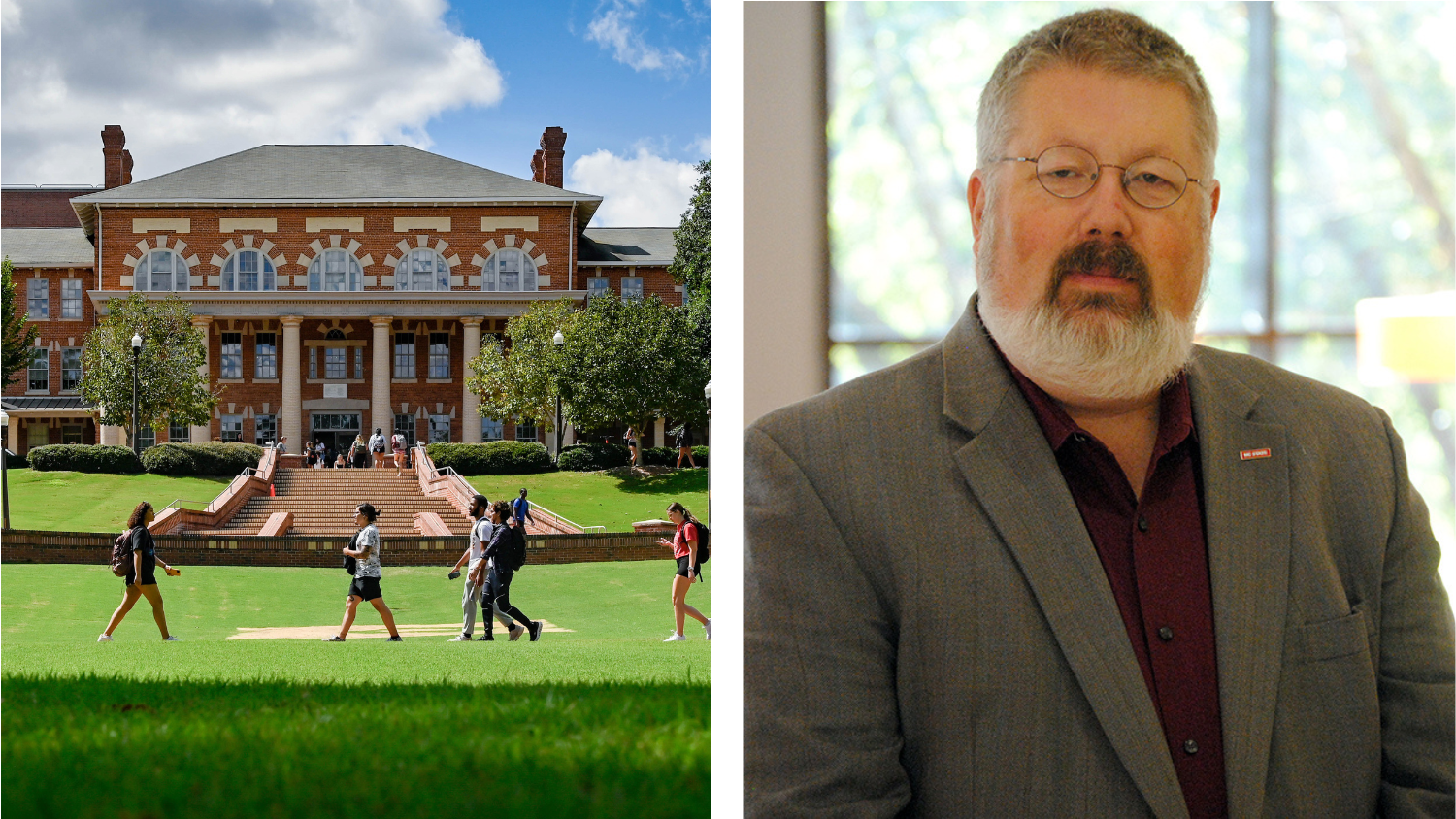Learn Japanese Theater the Noh Way

 Watching a performance of Japanese Noh theater is like traveling in time and space to medieval Japan. The carved wooden masks, elaborate robes, stylized movements, traditional music and convention-bound themes evoke the cultural milieu of a bygone era. Members of the public and the NC State community will have a chance to visit that era in April when the co-founder of a modern Noh troupe comes to campus to lead a four-day program of workshops and demonstrations exploring this fascinating art form.
Watching a performance of Japanese Noh theater is like traveling in time and space to medieval Japan. The carved wooden masks, elaborate robes, stylized movements, traditional music and convention-bound themes evoke the cultural milieu of a bygone era. Members of the public and the NC State community will have a chance to visit that era in April when the co-founder of a modern Noh troupe comes to campus to lead a four-day program of workshops and demonstrations exploring this fascinating art form.
“Welcome to the World of Noh” will take place April 9–12 at various locations around campus. On April 9, playwright, composer and performer David Crandall of Noh company Theatre Nohgaku will conduct a free Noh performance workshop in the afternoon, followed by a free lecture-demonstration that evening. On April 10–12, Crandall will lead three full days of writing workshops (free to NC State faculty, staff and students) to help participants compose their own original Noh plays. Details about times and locations for these events can be found online.
Noh has been regularly performed ever since it was invented in Japan in the 14th century, making it one of the oldest continuously surviving art forms in the world. When asked why Noh has endured when so many other art forms have been lost to history, Gary Mathews, teaching associate professor of classical studies in the Department of Foreign Languages and Literatures, gives a succinct answer: “Because of the unbelievable emotional power Noh possesses.” Mathews is a co-founder of Theatre Nohgaku, and he’ll assist Crandall in conducting the weekend’s events.
Emotional Impact
“The very first time I saw a Noh play,” Mathews says, “it was on a video I had borrowed from a colleague. The play was about an angel who comes down from heaven and hangs her beautiful feather cloak on a tree. Along comes a fisherman who wants to take the angel’s cloak home with him because it’s so beautiful. The angel says, ‘If you do that, I’ll die.’ At the moment when the fisherman is struggling with whether to keep the cloak or give it back to the angel, you can see in the actor’s body all the emotion he’s feeling — Noh is a very physical theater, requiring a tremendous amount of nuance and discipline — and I just started to cry. And that was just from watching a video. Imagine how powerful it is in real life.”
Noh, meaning “skill” or “talent,” evolved out of ancient forms of dance drama that were imported into Japan from China during the eighth century. Over the next few centuries two prototypical forms of Noh emerged, one performed for nobility and the other performed for commoners. The great innovation of Noh’s inventors, the actor Kanami and his son Zeami, was to unify the forms into a single standardized art in the 1300s. The samurai class ruling Japan at the time — the shoguns who had deposed Japan’s emperors — supported Noh because it gave them a way to extend their influence over the country into the cultural realm. Once Noh came under the influence of the shogunate, it became the extremely refined art form it remains today.
As a professor of classics, Mathews’ academic specialty is ancient Greek and Roman language, literature and society, and he became interested in Noh because of its similarity to ancient Greek tragedy; both art forms are highly stylized dramas using music, dance and masks for the actors.
“Once I began my teaching career, I thought, this is the time to explore Noh. So how do teachers learn about anything? By assigning it for a course, usually,” he says with a smile. “I assigned some Noh plays in an introductory world literature class. The scripts are very short, though, because they’re filled out in performance with music and dance, so the only way for me to really teach them was to have the students perform them. We made very simple masks out of construction paper, and we didn’t even memorize the lines; we just held the book and read from it. And believe it or not, all of a sudden that play came to life. I realized then that this is a profound art form that I had to learn more about.”
Spreading the Art Form
Later Mathews began taking Noh instruction from Richard Emmert, an American who had trained in Japan to become a certified instructor of Noh. Emmert’s classes became the nucleus of Theatre Nohgaku, which performs both traditional Noh plays and original Noh scripts written by the company in English.
“Richard had a dream of creating Noh scripts in English as a way of spreading the art form around the world,” Mathews says. Since 2000 the company has performed and taught workshops throughout the United States and in Japan. (A video of Theatre Nohgaku performing one of their English-language Noh plays is available online.)
“Workshops are a big part of what we do because education and outreach are very important to us,” Mathews says. “Whenever we go on tour to do performances, we do workshops too, as side activities related to the performances.”
In the two-hour performance workshop taking place on the afternoon of April 9, participants will learn about and practice Noh’s disciplined stage movement and its chanting style of delivering lines. That evening’s lecture-demonstration will open a window onto the history and practice of Noh, including the influence of Buddhism on Noh.
“The Noh performance style is deeply imbued with Zen Buddhist esthetics,” Mathews explains. “The stage is often bare, with either no props or very simple props, and all the movement and vocal aspects are highly stylized. The idea is that by deliberately making the outward forms on the stage unrealistic, you focus the audience’s attention on the heart of the story, leading to a deeper recognition of truth. In Zen that would be a religious truth, but in Noh it’s an emotional truth, an encounter with a character’s heart, an experience full of pathos and feeling.”
Mixing Cultures
The writing workshop will consist of three eight-hour days when participants learn the rules governing Noh drama and begin to compose their own original Noh plays. “One of the reasons we started doing these writing workshops was so Theatre Nohgaku could get some more English-language plays to perform,” Mathews says. “Who knows, maybe one of our next plays will come out of this workshop.”
Theatre Nohgaku’s most recent project is a play about Elvis Presley, of all things. “The play is called ‘Blue Moon Over Memphis,’” Mathews says, “and it’s about how lonely Elvis was. Most Noh plays will have one key idea or image or emotion that the play highlights and builds on and builds on. By the end of the play we want the audience to have a profound — and possibly completely new — emotional understanding of the man.”
“One of the chief values of the arts is to make you feel something,” Mathews says. “Noh can do that.”
The performance and writing workshops are almost full, but a few slots are still open in both events. To reserve a seat, contact Gary Mathews at gary_m@ncsu.edu.
By Brent Winter. This article first appeared in the NC State Bulletin
- Categories:


